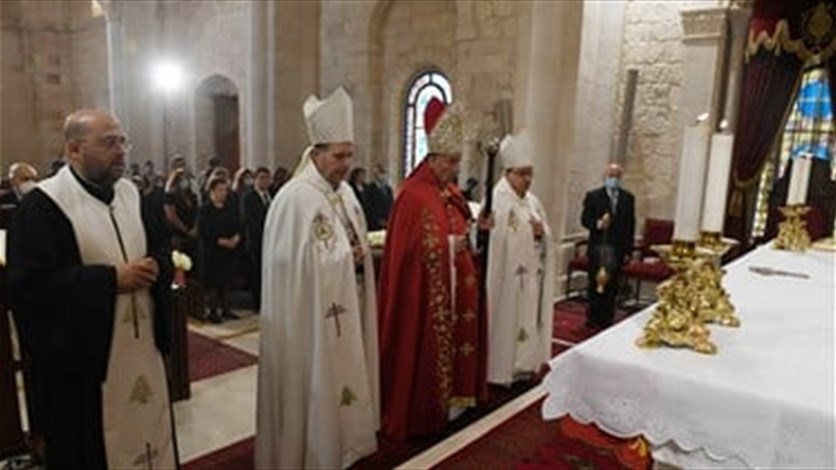
by lbcgroup.tv -- Maronite Patriarch Cardinal Bechara Boutros Al Rahi appealed for a Lebanese and international surveillance of the electoral process starting today. Speaking in his religious sermon as he presided over Sunday Mass this morning, the Patriarch said: "While the people and friends of Lebanon want a better future for the country, we are keen on holding the parliamentary elections at their constitutional dates, so that changing the dates, amending the existing law, and circumventing the participation of expatriates do not become excuses that threaten the holding of elections against the will of the people and the international community." He added that "tampering with the issue of elections this time would lead to risks of unknown repercussions…
The people want the elections as an opportunity to change their painful reality, and a starting point for a new national life. The people want transparent and fair elections, far from political money that bets on people's poverty to buy their votes and conscience. Therefore, we call, from now, for Lebanese and international monitoring of the electoral process." Over the new government’s mission, the Patriarch said: "We are counting on the current government, especially on its head, who assured us, in his honorable visit yesterday, of his determination to work to overcome the many obstacles that would confront his cabinet, and to embark on the reform workshop immediately, without which there is no success, aid, or Arab and international solidarity."
by By Tamara Qiblawi, CNN — Lebanon’s main state electricity company supplied around two hours of power to the national grid, local …
BEIRUT, (Reuters) – Lebanon has no centrally generated electricity after fuel shortages forced its two largest power stations to shut down, a …

by reuters -- Lebanon's central bank denied on Friday a Swiss newspaper report that alleged the International Monetary Fund had removed information from a 2016 report on the country at the request of central bank governor Riad Salameh. Switzerland's Le Temps said in a report on Thursday that in 2016, as Lebanon was headed towards financial ruin, 14 pages containing vital information were removed from an IMF assessment through the intervention of Salameh. Reuters could not independently verify the report.
Salameh did not respond to a request from Reuters for comment. "This article and everything that was mentioned in it has nothing to do with the truth," the Lebanese central bank said in a statement. "What was reported in Le Temps newspaper makes clear the article is not serious as it says the governor of the central bank of Lebanon personally omitted 14 pages from a report of an international and respectable organisation like the IMF." According to the IMF's transparency policy, deletions to staff reports are generally considered at the request of the authorities of the country the report is about.
"Deletions should be limited to information that is not already in the public domain that constitutes either: Highly market-sensitive material, mainly the Fund's views on the outlook for exchange rates, interest rates, the financial sector, and assessments of sovereign liquidity and solvency," the IMF rules, published in 2014, say. An IMF spokesperson told Reuters the 2016 report had highlighted as an early warning key vulnerabilities facing the Lebanese financial system. "It emphasized the need to reduce economic and financial risks, including the reliance on new deposit inflows to cover large fiscal and external deficits. It also pointed to significant resources that would be needed to ensure banks remained capitalized in the event of a severe shock," the spokesperson said. Lebanon is suffering what the World Bank has described as one of the deepest depressions in modern history. Its economic meltdown has thrown three-quarters of the population into poverty and the Lebanese pound currency has lost 90% of its value in the past two years.
Khazen History


Historical Feature:
Churches and Monasteries of the Khazen family

St. Anthony of Padua Church in Ballouneh
Mar Abda Church in Bakaatit Kanaan
Saint Michael Church in Bkaatouta
Saint Therese Church in Qolayaat
Saint Simeon Stylites (مار سمعان العامودي) Church In Ajaltoun
Virgin Mary Church (سيدة المعونات) in Sheilé
Assumption of Mary Church in Ballouneh
1 - The sword of the Maronite Prince
2 - LES KHAZEN CONSULS DE FRANCE
3 - LES MARONITES & LES KHAZEN
4 - LES MAAN & LES KHAZEN
5 - ORIGINE DE LA FAMILLE
Population Movements to Keserwan - The Khazens and The Maans
ما جاء عن الثورة في المقاطعة الكسروانية
ثورة أهالي كسروان على المشايخ الخوازنة وأسبابها
Origins of the "Prince of Maronite" Title
Growing diversity: the Khazin sheiks and the clergy in the first decades of the 18th century
Historical Members:
Barbar Beik El Khazen [English]
Patriach Toubia Kaiss El Khazen(Biography & Life Part1 Part2) (Arabic)
Patriach Youssef Dargham El Khazen (Cont'd)
Cheikh Bishara Jafal El Khazen
Patriarch Youssef Raji El Khazen
The Martyrs Cheikh Philippe & Cheikh Farid El Khazen
Cheikh Nawfal El Khazen (Consul De France)
Cheikh Hossun El Khazen (Consul De France)
Cheikh Abou-Nawfal El Khazen (Consul De France)
Cheikh Francis Abee Nader & his son Yousef
Cheikh Abou-Kanso El Khazen (Consul De France)
Cheikh Abou Nader El Khazen
Cheikh Chafic El Khazen
Cheikh Keserwan El Khazen
Cheikh Serhal El Khazen [English]
Cheikh Rafiq El Khazen [English]
Cheikh Hanna El Khazen
Cheikha Arzi El Khazen
Marie El Khazen